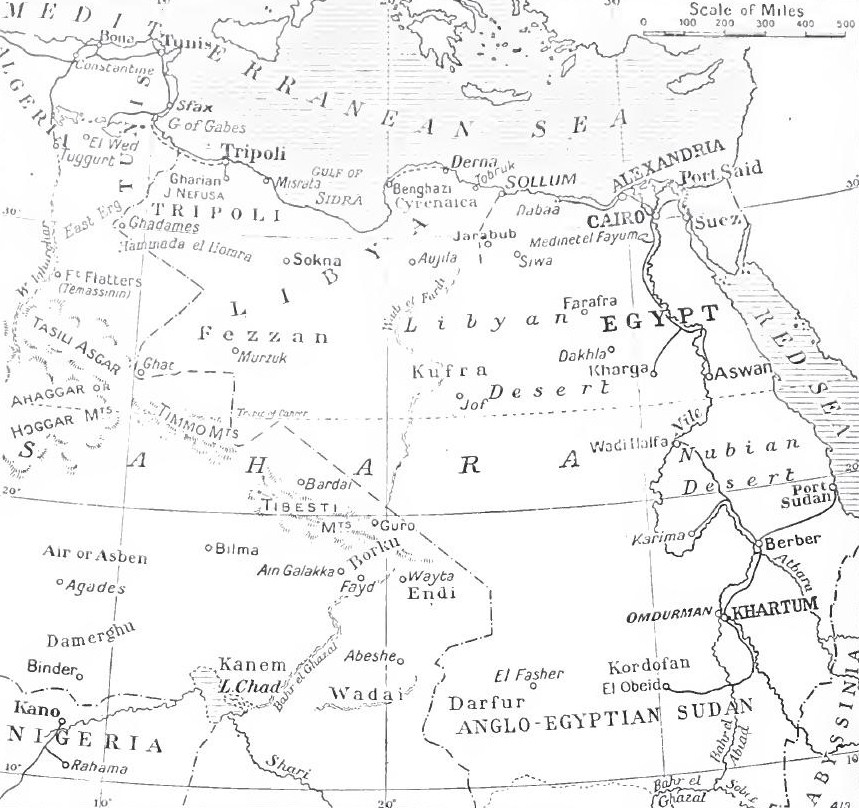published a 3-part series based on the journey made by
an Egyptian named Hüsnü Bey the year before across
the Sahara Desert, from the Mediterranean coast to
El-Ubeyd in Sudan.
Herewith, TNT presents the first of a multi-part series
from the transcription-translation of the Ottoman
Turkish original.
A Turk's Trans-Sahara Adventure in 1908 click here
for the TNT tale of Sami Çölgeçen, who fled Fezzan in
southwestern Libya, where he was in exile, across
the Sahara to the Nigerian coast and from their to
England and Istanbul.//

Sellum (Sollum) is west of Cairo on the Med coast and
El-Ubeyd (El Obeida) is southwest of Khartoum.
A Great Journey in the Libyan Desert
Last year (1925), Hüsnü Bey, the former first secretary at the
Egyptian embassy in Washington, made an important journey in the
Libyan desert. America's National Geographic magazine
characterized his trip as "a rare triumph in the world of geography."
Actually, when one examines the traveler's journal it is impossible
not to agree with these words.
Hüsnü Bey's 3,520-kilometer journey began at the port of Sellum,
(El Salloum on the Egypt side of today's Libya-Egypt border), which
is located between Tripoli and the Egyptian border, and headed south
into the desert and, up to now, vast, uncharted territory. Hüsnü Bey
found two oasis that are important from a strategic perspective, before
completing his journey at El-Ubeyd in Sudan.
This amazing trip was conducted under the auspices of the Egyptian
King and the Egyptian traveler explained that "The possible existence
of lands unknown to civilized man is enough to excite the zeal of a
traveler who wants to have an adventure. But in transitting the Libyan
desert from north to south, I was thinking of completing the trip I made
to the Kufrah oasis in 1921 to demarcate Egypt's western border."
The traveler, Hüsnü Bey, left Sellum with a small caravan and headed
for the Siwa oasis. He had to pass through the lands controlled by the
Senussi sect and he gave us some relevant information about the
Senussis:

"About 100 years ago, the Algerian Muhammad ibn Ali as-Sanussi
went to Mecca via Tripoli and got the idea to make the area of Libya
the place for his exercise in religious zeal. A few years later, he
established a medrese at the town of Jaghbub in the Libyan desert
and his fame spread quickly all around. The religion he espoused was
Islam's most basic and pure: abandon worldly goods and avoid coffee
and tobacco."
Hüsnü Bey related that five or ten years ago a Senussi was severely
punished for using tobacco and, in fact, the transgressor's hand was to
be severed if he continued! The Senussis do not accept foreigners in
their lands and here is what Hüsnü Bey told us in that regard:
"I found it very interesting that this prohibition is not based on religion
but, rather, from the Senussis' love of their homeland. The various
tribes' thinking in this regard is quite simple: they don't want foreigners
because they bring oppression and, as a consequence, taxes and
customs regulations, which are quite undesireable for them. So the best
way to protect themselves against these collections is to keep their
lands closed to foreigners. And the foreigners who want to come in
are European travelers, meaning they're Christians, all of whom must
be chased away."
//END of PART I//

Hiç yorum yok:
Yorum Gönder